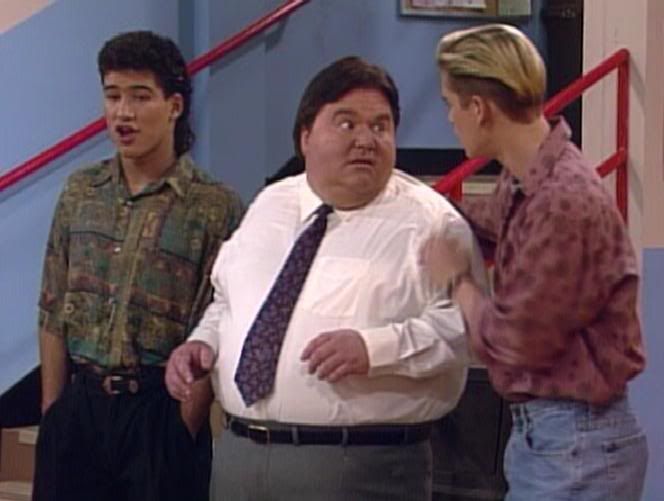Excuse me, but I'm about to get political with my blog. I promise this won't be a frequent thing. I guess with yesterday being election day, I am slightly inspired to write about a topic that I'm sure will not make me popular with other teachers. There has been a lot of talk the last few years about reforming America's educational system. From No Child Left Behind to Race to the Top, there's no shortage of politicians who have some opinion on how to fix America's schools. I think everyone can agree that the motivations and intentions behind reform efforts are well-intentioned: we want to have the best schools in the world providing the best quality education for tomorrow's future. So why is it that teachers are often the people who stand in the way of change?
In one episode of Saved By the Bell, the teachers, encouraged by Zack and Slater who wanted to go on another ski trip, went on strike. Zack later felt guilty because the strike prevented the Academic Quiz Bowl Championship against Valley from happening and Jessie and Screech were looking forward to competing (how Lisa made it on the team I'll never know). The silliest part of the episode, besides Zack filling in for Screech on the quiz team was what it took for the teachers to call off the strike and go back to work: things like money for a staff Christmas party, a staff lounge, and closer parking spaces. Really? That's what got Mr. Tuttle and the other teachers all hot and bothered?
That may not be the greatest metaphor to use, but today's real-life teacher's unions feel the same to me. Don't get me wrong, I understand and appreciate the hard work that unions do, negotiating salaries and benefits, and standing up for teachers when necessary. But I also think that unions can be a hindrance. As a teacher, I believe that my highest priority should be what is best for my students, not for myself. So if that means staying late at school to hold a study session for my classes, or working through my lunch break with other teachers or students, or coming in on a furlough day to get my classroom ready for the first day of school, or anything else that goes beyond what I'm "contracted" for...I'm going to do it! It also means that if my administration wants to evaluate and monitor me as a teacher to make sure I'm doing a good job for the students I'm responsible for (no matter how long I've been a teacher), then I welcome that.
In almost any other professional field (business, law, medicine, corporations, sports, etc.), you're held responsible for the work you do. If that performance is not up to par or falls short of expectations, you could be demoted or even fired. And while that does suck...most people would agree that it at least makes sense. So why are teachers so afraid of that kind of accountability? Unions are strongly opposed to any political plan by the government, Democratic or Republican, that allows schools to get rid of bad teachers. In fact, many politicians won't touch school reform for fear of losing the unions' voting support! Teachers want the same perks you find in the business world such as tenure, job security, and benefits, but are not willing to have the same kind of accountability! Heaven for bid we actually try to fix the teachers who are in charge of our students! Certainly there needs to be an agreed-upon measuring stick for what constitutes a good and a bad teacher (and it should be more than just test scores). And yes, teachers should probably have the opportunity to improve and change before being let go. But I don't want to work with poor teachers who are a part of the problem as to why America's schools are under-performing! Too many teachers are just going through the motions every year because they know their job is safe so they can do whatever they want. Teachers always claim that their students are their first concern...I think its time we act like it.
When I was in 7th grade, the teachers in my school district went on strike for a better contract and salary. Definitely, a worthy cause to protest. In their place, schools had to hire replacement teachers, usually subs or unemployed workers looking for a paycheck. Its no surprise that the quality of education my classmates and I got that semester was horrible (which I'm sure was the message teachers were hoping to get across). But that strike sent a larger message to me...it made me wonder if my teachers really cared about me? I am pretty sure that there isn't an issue so big that it would cause me to join the picket lines for teachers, because I just can't do that to my students. My hope is that within the next few years, teachers (and the unions that represent them) will stop being a political obstacle, standing in the way of needed changes and reform. We owe that to our students and to society as a whole. (This is where an Obama-like "Yes We Can!" feels appropriate...but I've already gone too political)




